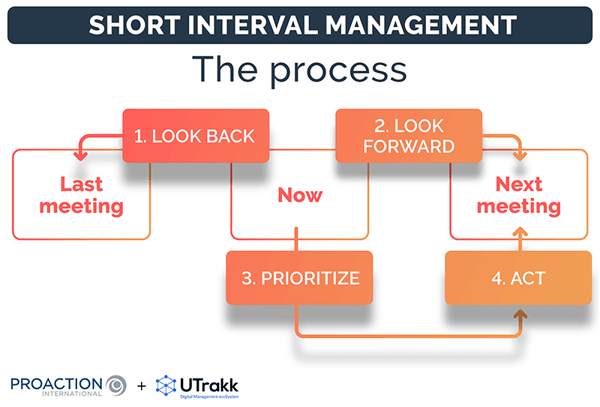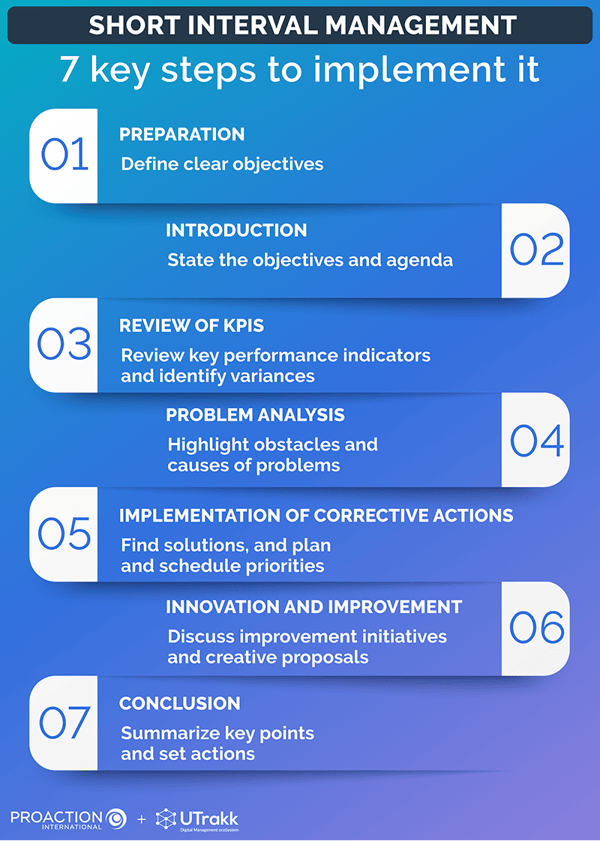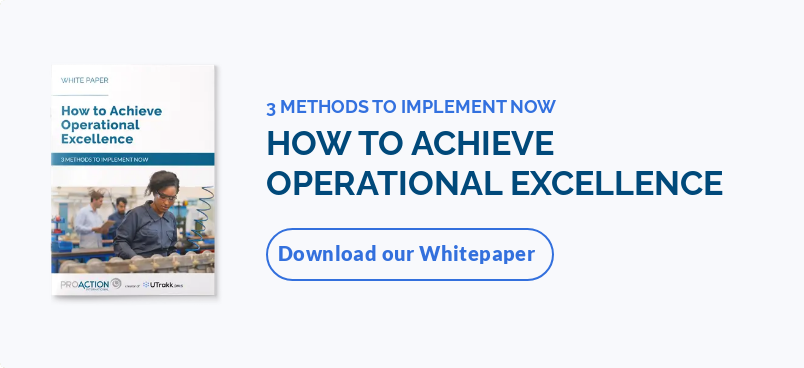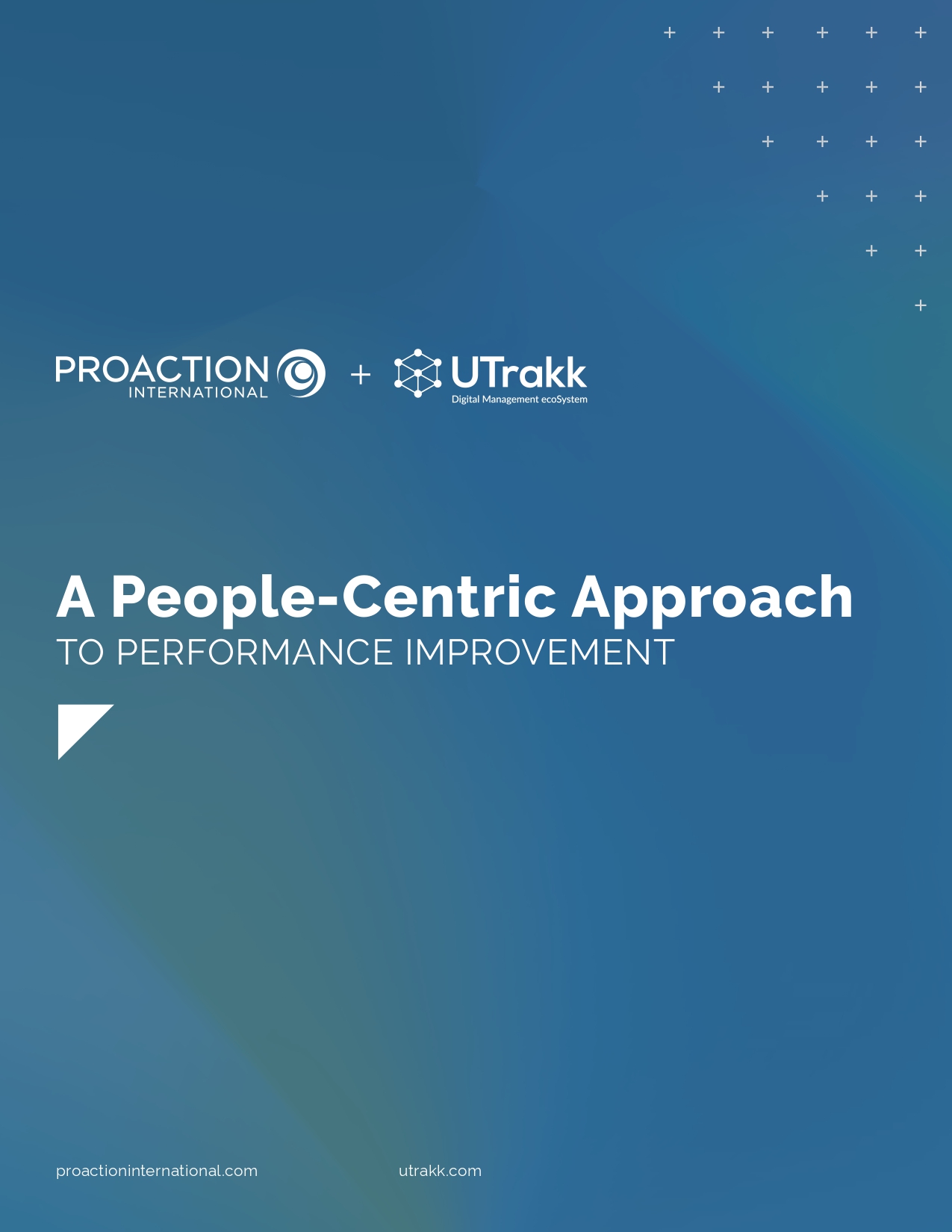What is Short Interval Management?
Short Interval Management (SIM), or Short Interval Control (SIC), is an operational management practice that focuses on brief and regular team meetings (daily or weekly). Its main aim is to monitor and analyze production performance, identify problems, define escalated priorities, and implement adjustments.
SIC process takes place directly in the workplace (workshop or factory floor, meeting room, etc.), and the number of people involved varies according to the size of the team concerned and the nature of the project or production line. However, the idea is to keep the number of participants small enough to maintain the meeting's efficiency and dynamism.
Like an ongoing feedback loop, SIC intervals ensure fluid communication within teams and encourages fast data-driven decision-making.
SIC processes are based on several principles:
- Frequency and brevity: They are frequent and divided into short intervals (15 and 30 minutes) to minimize the impact on working time. They should also start and finish on time to keep everyone involved and effective.
- Focus on key performance indicators (KPIs): Discussions focus on KPIs and production targets to assess performance and quickly identify gaps.
- Team involvement: SIM encourages operators and teams to participate in managing and continuously improving the manufacturing process, valuing their feedback and suggestions.
- Decision-making and problem-solving: One of the main aims of these quick and focused reviews is to enable problem identification and solution-finding.
This method, intrinsically linked to Lean Management, is used in many industries, particularly those where continuous improvement, operational responsiveness, and productivity are crucial (manufacturing, logistics and supply chain, aeronautics, automotive, etc.).

Why is SIM crucial for organizational performance?
SIM plays a decisive role in improving performance. Here are just some of the critical benefits of these meetings:
Facilitate problem-solving
SIM provides a structured framework for quickly identifying and resolving problems. Regularly bringing teams together for short but focused sessions encourages open and direct communication, bringing issues to light as soon as they arise. Solutions are then proposed and evaluated in real-time.
What's more, the active involvement of the entire team in the resolution process speeds up the implementation of improvement actions.
Accelerate decision-making
This short, frequent format ensures that information flows rapidly between decision-makers and operational staff, offering immediate responsiveness to the challenges encountered.
Thanks to data accuracy and by directly involving those at the heart of the action, SIM reduces the time between problem identification and resolution, fostering an organizational dynamic where decisions are made quickly and informally.
Increase productivity
Thanks to Short Interval Control, teams can analyze performance, identify obstacles to production, and provide more frequent course corrections. As a result, problems are solved quickly, and there is also less downtime and inefficiency as processes are continually optimized.
Encourage innovation and creativity
The SIM participative framework encourages innovation and knowledge sharing by creating a space where teams can regularly express new ideas and thoughts on challenges and opportunities. This constant interaction fosters a climate of trust where risk-taking and the proposal of new solutions are valued.
Foster communication and collaboration
SIM strengthens links and improves internal communication between colleagues and different levels of the hierarchy. It encourages all members to share their perspectives and listen to those of others, creating a working environment where transparency and the exchange of ideas are the norm.
These meetings also reinforce team cohesion and the collective ability to act unified and effectively.
Improve employee engagement
SIM positively affects engagement by directly involving workers in problem-solving and decision-making and giving them the space they need to express their ideas and concerns.
Short Interval Management induces a sense of belonging and value, as everyone's contributions are recognized and considered. It creates a motivating environment where employees are empowered and encouraged to take initiative. They are more satisfied with their work and feel more invested in the company's success.
7 Key steps to implementing effective SIM

1. Preparation
Clear objectives must be defined before each SIC meeting. Relevant performance data and key indicators (KPIs) are gathered and analyzed beforehand to enable a focused discussion. The aim is to identify what you want to achieve with these meetings.
2. Introduction
Each meeting begins with a brief introduction outlining the purpose of the meeting and the agenda.
3. Review of KPIs
Participants review performance indicators to assess progress against the previous meeting's objectives. This step enables gaps and areas requiring attention to be quickly identified.
4. Problem analysis
The team discusses operational issues identified through KPIs and shares obstacles encountered since the last meeting. The focus is on problem-solving and root-cause identification.
5. Implementation of corrective actions
For each problem identified, improvement actions are proposed, prioritized, and assigned. Tasks are clearly defined, with precise responsibilities and follow-up deadlines.
6. Innovation and improvement
The team can also discuss opportunities for improvement and innovation in manufacturing processes. It encourages the participation and creativity of all members.
7. Conclusion
The meeting ends with a summary of the key points discussed, a reaffirmation of the actions to be taken, and setting the date for the next interval.
Imperatives for successful Short Interval Control meetings
Several imperatives must be respected to maximize the effectiveness and impact of this approach on the organization:
- Preparation and clear objectives: Good upstream preparation ensures the meeting is focused and productive. The objectives of each meeting must be clear to all participants.
- Management commitment: Commitment and support from management are crucial to promote the importance of SIM within the organization and to encourage stakeholder involvement.
- Active participation: SIC meetings require the active involvement of all participants. Every member must feel free to express themselves.
- Action tracking: Setting up a tracking system using dashboards and/or management tools is essential to recording performance and actions taken.
- Effective communication: Clear and effective communication before, during, and after the meeting is fundamental to ensuring that information flows correctly between all levels of the hierarchy.
- Visual management: Visual aids (graphs, dashboards, and diagrams) present real-time data in a clear and accessible way, helping to identify trends, problems, and opportunities for improvement quickly.
Leverage digitalized SIM with UTrakk
The UTrakk Daily Management System (DMS) enhances Short Interval Management by providing a structured, digitalized framework for monitoring and improving daily operations.
UTrakk’s Rituals module facilitates the planning of regular SIM and the integration of these routines into the manager's daily or weekly agenda. It lets you define a meeting agenda, plan priorities and tasks, and assign owners, simplifying action plan monitoring and up-to-date information sharing with participants.
Dashboards help track progress and analyze results against predefined production performance indicators. At a glance, management teams can see if the identified variances persist despite the implementation of action plans, and take corrective actions if necessary.
During the SIM, UTrakk is an indispensable tool for sharing data and updates, discussing problems and brainstorming solutions, ensuring that meeting agendas, actions or tasks, and opportunities for improvement are accessible, documented and tracked efficiently, via a single, complete digital system.
By supporting digitalized SIM, UTrakk DMS improves problem identification and resolution, decision-making, collaboration, and agility, enabling organizations to drive continuous improvement and achieve operational excellence.
Short Interval Management: A pillar of operational excellence
Short Interval Management is a fundamental pillar for any organization aiming for operational excellence, especially in the manufacturing industry. This type of meeting embodies the essence of Lean Management, facilitating a proactive and reactive approach to challenges. It's not just a means of keeping teams aligned with performance objectives; it's also a driver of continuous improvement that stimulates innovation, productivity, and collaboration.
Successful SIM implementation reflects a company's commitment to optimizing processes, solving problems effectively, and creating a dynamic learning and employee engagement culture. So, by adopting these rituals, organizations are not just responding to day-to-day issues; they are demonstrating their deep commitment to progress, learning, and adapting to market changes.









